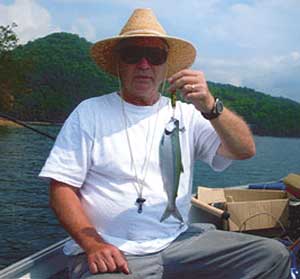
Western North Carolina lakes contain a veritable smorgasbord of gamefish, some common to lakes around the state, some found only in high-mountain lakes, and a few that are specific to only a couple of mountain lakes.
Mountain lakes have their share of largemouth bass, crappie, sunfish, perch and catfish, which are common statewide, but WNC lakes also have smallmouth bass, walleye and trout, species that prefer streams and lakes with cool, clear water. A few mountain lakes also contain more exotic fish such as muskellunge, hybrid bass, stripers and kokanee salmon.
Most of the common game fish were stocked in mountain lakes when they were built in the 1940s. Other species were introduced by the N.C. Wildlife Resources Commission, while some were introduced by well-meaning (but misguided) anglers, and a few merely made their own way to mountain lakes.
One of the more exotic species showed up last fall and made the state record books merely on the strength of being one of a kind. A Burke County angler caught a kokanee salmon at Nantahala Lake in Macon County. It was a small fish, weighing only 9.2 ounces and measuring 11 ½ inches, but because it’s an established species, it was given a slot in the record books.
Native to the western United States, kokanee were stocked in Nantahala Lake in the 1960s to provide a forage base for other game fish, namely steelhead trout, another species not native to the area. David Yow, fishery research coordinator for the WRC, said Nantahala is virtually devoid of nutrients, so wildlife biologists chose the kokanee as a forage fish because it lives primarily off plankton and other small aquatic organisms.
Because of many factors, Yow said, the kokanee didn’t do well, and they’re now “an artifact of an unsuccessful management experiment.” Only a remnant population survives. Yow said Nantahala Lake is managed primarily as a trout lake.
A few WNC lakes once had fair populations of steelhead trout, but Yow said most of the steelhead disappeared or were absorbed by other trout.
“Some of the lake trout may have some steelhead DNA, but the majority of the trout that fishers report as steelhead actually are rainbow trout,” he said. “They live full-time in the lake have about the same color as steelhead.”
Lake Lure in Rutherford County also has a type of trout not found anywhere else in the area. Between 1985 and 1987, the WRC stocked Rocky Broad River, Lake Lure’s main tributary, with the McConaughy strain of trout, a species that spends most of the year in the lake but goes upriver to spawn.
Fishers often mistake the McConaughy trout for steelhead because of its silvery color.
Lake Chatuge in Clay County is the only WNC lake that has hybrid bass, a cross between white bass and striped bass. These fish were stocked by the state of Georgia and once were widely dispersed throughout the lake.
The hybrids no longer are stocked, and the population eventually will die out.
Ann Lee of Lee’s Country Store on Lake Chatuge, a popular bait shop, said anglers still catch an occasional hybrid.
“We had some caught last summer,” she said.
Chatuge is home to another exotic, the spotted bass.
Chatuge once was a major smallmouth bass lake, but once the spots were introduced, they gradually displaced the smallmouth bass population.
Yow said the lake now is managed as a spotted bass fishery. Smallmouth bass seldom show up in creels.
The spots, incidentally, were apparently introduced by anglers. Yow said spots have never been stocked in WNC lakes. Although several other mountain lakes have spotted bass, they have not caused problems for resident smallmouth bass.
Walleyes, a native of northern lakes, were stocked throughout the mountains and have done well without causing problems for other species. Walleyes have done so well that supplemental stockings aren’t necessary. Walleyes and smallmouth bass have become the primary game fish for winter fishing in the mountains.
Muskellunge are indigenous to the French Broad River and the New River, and have either been stocked or migrated to adjoining lakes. Fontana Reservoir in Graham and Swain counties has muskies, as does Lake Adger in Rutherford County.
Species introduction requires tedious research and tireless experimentation. The results can be disastrous when two species have to compete for the same food source and habitat.
As Darwin so aptly illustrated, only the strongest survive.
The trouble with this model is that it may not be the desired species that survives.




Be the first to comment